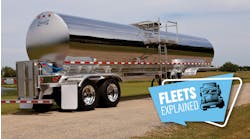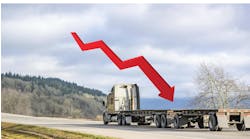The U.S. House is expected to vote Nov. 30 on whether to stop a potential freight rail strike and avoid widespread economic fallout that would affect several industries, including trucking, during the busy holiday season.
The vote would impose the terms of a tentative agreement from September that was made in talks between union representatives and rail companies. Eight of the 12 freight rail unions compromised to reach the deal at the time, but four unions rejected it, making a strike possible as early as Dec. 9.
President Biden released a statement urging Congress to bind the unions to the September agreement, writing: “A rail shutdown would devastate our economy. Without freight rail, many U.S. industries would shut down. My economic advisors report that as many as 765,000 Americans—many union workers themselves—could be put out of work in the first two weeks alone. Communities could lose access to chemicals necessary to ensure clean drinking water. Farms and ranches across the country could be unable to feed their livestock.”
A rail strike could halt an industry that carries over 25% of U.S. cargo by weight, according to data from the U.S. Department of Transportation’s Bureau of Transportation Statistics. An industry trade group, the Association of American Railroads, reported a strike could cost the American economy as much as $2 billion per day.
There is worry within the trucking industry that supply chain capacity would shift to truckload carriers, which would require 460,000 additional long-haul trucks that the industry could not supply, American Trucking Associations President and CEO Chris Spear said in a Sept. 9 letter to Congress.
See also: Diesel drives fleet costs, freight market shifts
“ATA calls on Congress to act immediately to resolve this looming issue,” Spear wrote in a Nov. 28 statement. “Further delays only result in more uncertainty and inflationary pressure at a time when the economy is straining under the weight of both. Trucking is not alone in calling on Congress to act immediately—hundreds of organizations and President Biden have all also urged lawmakers to end this stalemate.”
Rail strike could undercut trucking's diesel supply
The potential strike also heightens recent concerns about a diesel supply shortage. A portion of diesel fuel is moved by rail, and a strike would strain capacity of other modes of transportation, such as trucks and barges.
The chances of a crippling shortage have lowered as inventories have risen and diesel prices have dipped. But a strike could place additional strain on a diesel supply that is 13% below the average for this time of year, according to data from the U.S. Energy Information Administration.
“A shutdown is a scenario that is not acceptable,” Transportation Secretary Pete Buttigieg told NewsNation, saying that, “We’ve made headway on trucking” while adding, “we don’t have enough trucks or barges or ships in this country to make up for the rail network.”
Union response to the rail strike vote
The September agreement included a 24% wage increase from 2020 through 2024, with back pay being distributed to workers’ wages from 2020 to the present. Engineers and conductors were given three more days of paid time off to attend medical appointments as long as they scheduled them at least 30 days in advance. However, for four of freight rail’s 12 unions, that was not enough.
“It is not enough to ‘share workers’ concerns,’” responded rail union Brotherhood of Maintenance of Way Employes Division in a statement. “A call to Congress to act immediately to pass legislation that adopts tentative agreements that exclude paid sick leave ignores the Railroad Workers’ concerns. It both denies Railroad Workers their right to strike while also denying them of the benefit they would likely otherwise obtain if they were not denied their right to strike.”




